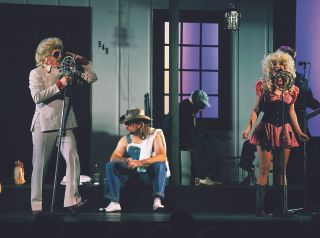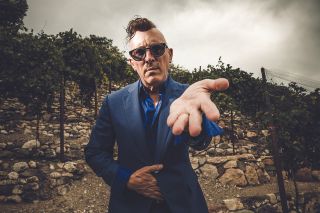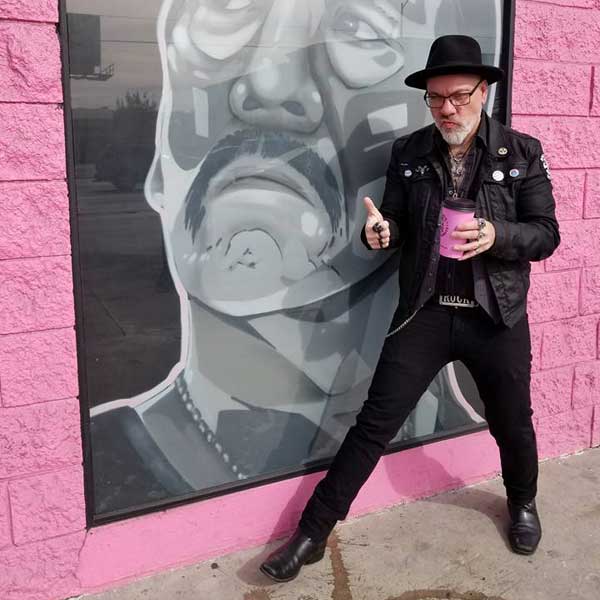It’s 8am, a wretched time for anyone, really, but more so for rock’n’roll types. Not Maynard James Keenan, however. He’s been up since 6:30am – primetime in the wine-making world. It may be surprising to know that the Grammy-winning singer is a very hands-on winemaker, processing the day’s haul of grapes with only the help of his partner, Tim White. “We don’t have a bunch of Oompa-Loompas doing it for us,” he says. “We work 12-hour days from mid-July all the way through October. It’s like making soup from scratch. You can’t just walk away from the stove.”
Metal Hammer has travelled to Caduceus Cellars, the winery that Maynard owns and operates in Jerome, Arizona. He is the last of the reluctant rockstars: a reclusive man of mystery and blurry mystique who somehow turned Tool, an apocalyptic prog metal band with terrifying claymation videos, into one of the most oddball rock success stories of the 90s and 00s. He followed that platinum-plated act with the ethereal, chart-making alterna-metal of A Perfect Circle and, since 2003, has been working on his increasingly twisted solo-project, Puscifer. More of an all-encompassing multimedia extravaganza than a band, Puscifer’s industrial throb is the buzzy backdrop to a jaw-dropping stageshow that finds the usually cantankerous Maynard getting real, real gone for a change, hiding deep inside cartoon-y costumed characters like the mustachioed, fluffy-wigged, hapless hillbilly Billy D, and putting on riotous performances that are part vaudeville act, part searing rock’n’roll testimonial.

With the arrival of Puscifer’s third album, Money Shot, Maynard’s ever-evolving vision adds another dimension: wine. The album is a celebration of harvest season; the noisy culmination of Maynard’s toil and trouble. For the last few years, he’s scheduled tours and releases around the process of winemaking, creating revolving seasons of music and drink. It’s difficult to say how, exactly, this all pieces together – Money Shot vacillates between a crazy machine-chug and a fluttering, devotional drone, neither of which sound wine-drunk in the slightest – but be assured, they are all essential cogs in the infernal machine that runs our grape-suited hero’s fevered imagination. “Wine, women and song, right?” laughs Maynard. “I mean, it really goes hand in hand.”
A hundred years ago, Arizona was rife with vineyards, but when alcohol was outlawed during the Prohibition period in the US, they vanished. “They wanted to play goody-goody with the government to get statehood,” sighs Maynard, clearly passionate about growing grapes. “So they pulled all the fucking vines out.”
But through local growers such as Caduceus Cellars, the wine industry in Arizona is now flourishing once again. “It’s changed the economy out here,” he says proudly. “In a time where people are trying to figure out what to do with their local economies and with the local movement happening and the slow-food movement, the farm-to-table movement, this is going hand in hand with that. It fosters a commitment to an area. And it actually borders on the artistic. This is not just a utilitarian endeavour; this is an artistic process that involves music. You kind of have to be a creative person to be in the wine world.”

There is no hint of humour or irony in Maynard’s statement. He believes it, firmly. To him, there is little difference between his vineyard and his recording studio. In fact, when pressed as to whether he still even considers himself a rock singer first and foremost, Maynard bristles at the idea that he should even have to choose.
“The two have never been separate,” he insists. “The music has never been not-happening. Look at my track record; I’ve released something every two years. That’s my normal cycle. And as far as music or wine is concerned, I feel like when you’re involved in whatever process it is, as an artist, it just becomes your focus.”
- The 50 best Metallica songs of all time
- This is the setlist from the all-star Chris Cornell tribute show - with pictures
- Whitechapel return with brooding new track Third Depth
- Slipknot’s Corey Taylor confirms studio return
And his focus, as soon as the wine is processed, is Puscifer. The long-running project has always served as what Maynard describes as a “playground for the voices in my head”, and while it is a band – Puscifer has a busy discography, including two full-lengths before Money Shot and a host of EPs, remix and live albums – it has also served as a clothing line and the inspiration for short films, music videos, and a complex live revue. As Maynard explains, Puscifer’s slow but steady ascent to his main music gig is due largely to the implosion of the music industry and the advent of cheaper, and better, home technology.
“I started Puscifer when you couldn’t really see Puscifer through to the end because of the nature of the industry and the economy,” he says. “This thing started in the mid-1990s, and you couldn’t make a video; you couldn’t do animation then for less than half a million dollars. You just didn’t have the technology; you didn’t have the computer programs to just kinda do the stuff at home. So I couldn’t go forward with the project because of all the things I wanted to do. I mean, if you wanted to make a video, you had to hire a director of photography and you needed a craft services table and all that stuff. Now you can do it all on your iPhone. So there was an interim when I had to wait for the industry and for technology to catch up so I could do what I wanted to do with this project.”

Puscifer released its first album, “V” Is For Vagina, in 2007 – a year that saw the music industry essentially self-destruct. Sales of CDs plummeted, dropping 15% as physical media gave way to digital sales and, more often than not, piracy. Labels bled money. The monolithic Tower Records succumbed to bankruptcy and shuttered stores all across the US, and many moms and pops soon joined the death march. And Puscifer – who had a fairly powerful promotion-machine guiding their way – suddenly found themselves struggling for air.
“From the time we started recording our first album until we released it, the industry disappeared,” explains Maynard. “So Puscifer, as an independent band, we’ve fought an uphill battle to develop an identity. Because there’s no longer that machine to plop us in front of you, to say ‘This is a thing’. I’m talking about the same thing with the wine as I am with Puscifer. You don’t see it, because there’s no longer that beaten-path formula. We’re not in Billboard, so we don’t exist. We don’t exist to most people because we don’t appear in those boring, archaic spaces. We’re not there. It’s the same thing with my wine; people are looking in Whole Foods or on some wine searcher thing online and they can’t find them, but I’m selling 8,000 cases of wine a year. But because people are looking in the wrong places, they don’t know where to find it. Well, it’s because we’re independent. I could sell it directly to you, man.”
And that, essentially, is what Maynard is doing today. Selling Puscifer. Money Shot is not the most approachable album he’s ever done, and it’s not heavy by the standard definition, but it is a deeply affecting album that might accurately be described as ‘digital-organic’, with sparse vocal harmonies as dry and breezy as the arid desert winds swirling delicately around bubbling and buzzing machines. It’s also ruthlessly eclectic. On the one hand, there’s the walloping, Foetus-esque industrial sleaze of songs like the title track, and on the other, the wavering heat-haze of quieter, more introspective numbers, such as the drone-poem prayer Grand Canyon.
“You have to stand on the edge of the Grand Canyon to actually truly appreciate it,” Maynard says, explaining the song. “The only way to do that is to make the time. And when you’ve made the time, when you’ve decided to walk away from whatever rut you’re stuck in and make a pilgrimage to it, it really forces you to rethink how small you are. I encourage people to go to those places. I encourage people to go witness these places, just because it puts things in perspective and kind of retunes you to understand that quibbling over, you know, an Amazon delivery charge is probably the last thing you need to worry about.”
As with recent Puscifer releases, Money Shot features vocals from Carina Round, cello by Maynard’s son Devo, and songs co-written by his frequent musical partner, guitarist Matt Mitchell. While the tracks flow effortlessly into one another, Maynard says the album is not necessarily a fully connected narrative. “I think they’re related short stories,” he says. “I don’t know that they’re all completely connected, except that they’re all from my perspective, so they’re basically connected islands.”
The album was written and recorded partly at the vineyard, and with a fairly novel approach to songwriting.
“I have the ideas for songs, I just can’t always express them until somebody puts them into a concrete format,” Maynard explains. “Then I can actually bounce off it. So I’ll say to Matt, ‘Watch this movie’, or ‘Read this book’, and then come up with a mood for this song, and then put it in this tempo, and then take it from 4⁄4 and put it into 5⁄4.’ Sometimes that works, sometimes it doesn’t. But when it does work, that’s when you get an album with 10 or 11 good songs.”
There is another component to Maynard’s life that may or may not inform his next move beyond Money Shot. Three months ago, the 51-year-old singer, winemaker, father, writer, actor and all-round bon vivant underwent hip replacement surgery. He’s fairly certain which one of his occupations did him in.
“Twenty years’ touring and stomping around on a stage – that’s what did it,” he says. “And there were people bitching at me while I was in the hospital to get back on the road, and I was like, ‘Fucker, I’m in the hospital because of the road, so go fuck yourself and get some perspective. I’ve done more in a week than most have done in a lifetime.”

Things are now looking good for Maynard and his hips, and he’s about to return to one of his other passions, the high-contact martial art jiu-jitsu, in which he’s working towards a brown belt, one of the highest ranks in the sport, reserved for students with great levels of skill and at least five years’ experience.
“Jiu-jitsu is about finding your boundaries,” he says. “It’s a humbling experience, because there’s always somebody who’s much better than you are. If you can get your head around that and accept that and really just be concerned about yourself, learn about your boundaries, learn about your place in the world, then you can exceed and move forward with whatever limitations you have. I’ll never be in the Octagon,” he says, referring to the brutal combat of Mixed Martial Arts. “I know that; I don’t have that level of skill. But if I can get better than I am today, that’s a lesson for everybody. Just try to be better today than you were yesterday. Find a way to improve where you are, because if you do, everyone benefits. You wanna heal the world? Get better. Do better today than you did yesterday.”
Of course, there is a chance – infinitesimal as it may be – that none of this is relevant to the interests of your average Earthdog/rivethead/Hell-rat. Maynard is pretty well-ensconced in his vineyard at this point making wine, not Tool records. Their last album, 10,000 Days, was released in 2006. And so, the obligatory question for the fans – what’s going on with his other band?
“I’m reluctant to say anything about Tool, but I will say I write words to music,” Maynard sighs. “I write words and lyrics and melodies to music, and I can’t do that if I don’t have music. That’s really all I want to say about it.” And so it goes. He does, however, plan on touring with Puscifer. Just as soon as the wine is made. “Absolutely,” he says. “We’re taking Puscifer on the road. It’s just a matter of finding time. The harvest usually puts the kibosh on everything. I just crushed my 80th ton of grapes, and I have another four sitting there waiting for me as soon as this interview is done.”
And thusly we leave Maynard to press his grapes, sell his wine, don his wigs, and get a little better every day. Puscifer will continue to mutate into strange new shapes, guided largely by the whims of a man who is intent on forging music into poetry, drink into truth, life into art. If you’re gonna get drunk on rock, after all, it might as well be the good stuff.
This article originally appeared in Metal Hammer issue 275


